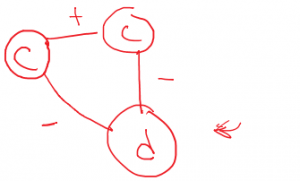Peers Are Now Paranoid Of Each Other
An easy example of a network in today’s technological environment is a peer to peer file sharing service. It has been known that for a healthy network to exist in a P2P (Peer to Peer) service, there has to be nodes (humans with a computer) giving and receiving data. Some nodes are more generous than others, called “seeders”, while others only take data without giving back, called “leechers”. But in this case, the nodes that we are particularly interested in are the seeders. They are notoriously labeled as the “good guys” in the P2P community, but copyright holders think otherwise. With there being an increasing amount of copyrighted content being leaked on to file sharing websites, copyright holders are now joining into the P2P fray, not as regular consumers, but polices of their content.
First off, why are the seeding nodes targeted in a P2P network? By seeding, the person’s hard disk is allowing the distribution of the content so that peers can access and download from the node. This is a red flag to any copyright holder who wants to end copyright infringement from the root: the person who is distributing the content illegally. Peers in a network can’t leech from a node who isn’t seeding, and thus if shut down, so is the network.
There has been a significant amount of history in copyright infringement issues, with severe repercussions for file sharers such as Joel Tenenbaum and Jamie Thommas-Rasset who payed upwards of hundreds of thousands of dollars. But how do they get caught? Copyright holders are disguising as peers in the network, leeching copyrighted data from file sharers who are distributing their content. When connected to a node, copyright companies such as the RIAA/MPAA have access to an I.P address which gives information to the Internet Service Provider. Companies can then subpoena the service provider for details about the node’s user so that they can pursue later legal actions.
This has caused a movement to drive P2P sharing underground, with trackers going private so that they can control who has access to node content. Other solutions have been to use VPN services which mask a node’s information as a I.P address from countries that do not have developed copyright laws. While there are definitely ways to circumvent being caught, the more interesting development is in the relationship between peers now. There is no concept of trust anymore in a P2P network, so what does this mean in network speak?
Say a node that is “clean” (not a copyright spy) has a positive relationship with another node that is clean. A “dirty” node has a negative relationship with clean nodes, but a positive relationship with other dirty nodes. What type of graphs can this portray? Would our network ever be unbalanced? Lets check this graphics that I drew to convey this idea of this network being structurally balanced:
A dirty node naturally wants to connect to clean nodes, creating a structurally balanced network. There is no point for dirty nodes to connect to other dirty nodes as their would be no outcome as they are both trying to get nodes that are infringing on copyright, not themselves. Another scenario can be:
All the clean nodes are together, happily sharing the file between each other. Inherently, a P2P file sharing network is structurally balanced. It’s interesting to understand the inner workings of a network, and how such relationships are formed. In many countries, even governments are stepping up to stop file sharing as a whole, and are making examples out of people who violate copyright laws. But the question should now be, will this network ever be compromised? Can the dirty nodes eventually wipe out clean noes from the network? It is going to be interesting to see in the future as technology becomes more advanced and people find more ways to circumvent laws.
https://torrentfreak.com/uk-police-arrest-prolific-pirate-bay-uploader-150903/


